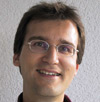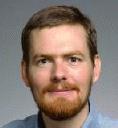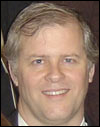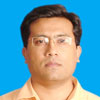
 About JCP
Get Involved
Community Resources
Community News
FAQ
Contact Us
About JCP
Get Involved
Community Resources
Community News
FAQ
Contact Us

|
 |
| |
The Java Community ProcessSM (JCPSM) program presented the sixth annual JCP Program Awards during the 2008 JavaOne Conference. These six awards are in the categories of JCP Member of the Year, JCP Participant of the year, Most Outstanding Spec Lead for Java Standard Edition/Enterprise Edition, Most Outstanding Spec Lead for Java Micro Edition, Most Innovative JSR for Java Standard Edition/Enterprise Edition, and Most Innovative JSR for Java Micro Edition. The nominations were made by the Executive Committees, and the winner in each category was determined by Executive Committee vote. Descriptions for each of these categories follow the list of this year's nominations. Here are the nominees and the winners for each category:
 |
 |
| |
 JCP Member Of The Year - This award recognizes the corporate or individual
member who has made the most significant positive impact on the community in the past year. Leadership,
investment in the community, and innovation are some of the qualities that EC Members look for in voting
for this award. JCP Member Of The Year - This award recognizes the corporate or individual
member who has made the most significant positive impact on the community in the past year. Leadership,
investment in the community, and innovation are some of the qualities that EC Members look for in voting
for this award.
JCP Participant of the year - (new category in 2007) - This award recognizes the corporate or individual member participant (individual name) who has made the most significant positive impact on the community in the past year. Leadership, technical contribution and innovation are some of the qualities that EC Members look for in voting for this award.
Outstanding Java SE/EE Spec Lead - The role of Spec Lead is not
an easy one, and the person who takes that responsibility must be, among other things, technically savvy, able to build
consensus in spite of diverse corporate goals, and focused on efficiency and execution. This award recognizes the person
who has brought together these qualities the best in the past year, in leading a JSR for the Java Standard Edition or Java
Enterprise Edition communities.
Most Innovative Java SE/EE JSR - Innovation is key to the success of the
JCP and helps ensure we remain a fresh and vibrant community. This award recognizes the Spec Lead and Expert Group that have
introduced the most innovative new JSR for the Java Standard Edition or Java Enterprise Edition communities in the past year.
Outstanding Java ME Spec Lead - The role of Spec Lead is not an easy one, and the
person who takes that responsibility must be, among other things, technically savvy, able to build consensus in spite
of diverse corporate goals, and focused on efficiency and execution. This award recognizes the person who has brought
together these qualities the best in the past year, in leading a JSR for the Java Micro Edition community.
Most Innovative Java ME JSR - Innovation is key to the success of the JCP
and helps ensure we remain a fresh and vibrant community. This award recognizes the Spec Lead and Expert Group
that have introduced the most innovative new JSR for the Java Micro Edition community in the past year. |
| |
|
|
|
|
 . . . . . . . . . . . . . . . . . . . . . . . . . . . . . . . . . . . . . . . . . . . . . . . . . . . . . . . . . . . . . . . . . . . . . . . . . . . . . . . . . . . . . . . . . . . . . . . . . . . . . . . . . . . . . . . .
Apache Software Foundation
The ASF is a membership-based, nonprofit corporation that provides organizational, legal, and financial support for Java-based, open source software projects. Since the release of JCP 2.0, the ASF has actively participated in the JCP community. Individuals representing the ASF have served on numerous Expert Groups and helped implement JCP specifications through, for example, Apache Tomcat, Apache MyFaces, Webservices, and Portlets projects. The ASF has impacted the direction of the JCP program by consistently driving collaborative transparency while serving on the Java SE/EE EC.
Intel
Intel joined JCP in June 2002. Intel won open election to the ME Executive Committee (EC) in November 2003 and won re-election in 2004 and 2007. Intel won an open election to the SE/EE Executive Committee in November 2004 and won re-election in 2005. It has been an honor to be elected to represent the community on both Executive Committees. In the ECs, we have tried to help JCP to continue on its evolution towards more openness and transparency. Intel has participated in 25 JSRs including JSR 270 Java SE 6, JSR 277 Java Modules, JSR 292 Supporting Dynamically Typed Languages, JSR 321 Trusted Computing, JSR 163 Location APIs, JSR 174 Monitoring and Management and many more. Java is very important for our customers across a broad arrange of devices that we sell hardware for. We have thousands of software engineers dedicated to ensuring our customers have first rate software that runs on our hardware. Our participation in JCP has been an important part of that.
TM Forum
TM Forum has been member of the JCP for two years, since when the OSS through Java Initiative (OSS/J) joined the TM Forum. During these two years the TM Forum have coordinated all the twelve JSRs related to OSS/J and their submissions to the JCP.
With the new TM Forum Interface Program, which includes OSS/J and other technical teams, the TM Forum will continue to leverage the JCP for the publication of Java interfaces related to OSS/BSS and media content management.
 . . . . . . . . . . . . . . . . . . . . . . . . . . . . . . . . . . . . . . . . . . . . . . . . . . . . . . . . . . . . . . . . . . . . . . . . . . . . . . . . . . . . . . . . . . . . . . . . . . . . . . . . . . . . . . . .
Patrick Curran

Patrick has participated actively in several consortia and communities including the World Wide Web Consortium (W3C) (member of the W3C's Quality Assurance Working Group, co-chair of the W3C Quality Assurance Interest Group), and the Organization for the Advancement of Structured Information Standards (OASIS) (co-chair of the OASIS Test Assertions Guidelines Technical Committee). Patrick maintains a blog at http://blogs.sun.com/pcurran/
Doug Lea

Doug Lea is a professor of Computer Science at the State University of New York at Oswego. He is author of the book Concurrent Programming in Java and co-author of the textbook Object-Oriented System Development. He is the author of several widely used software packages and components, as well as articles, reports, and standardization efforts dealing with object-oriented software development, including those on specification, design and implementation techniques, distributed, concurrent, and parallel object systems, and software reusability. Within the JCP, Doug was the Spec Lead for JSR 166, Concurrency Utilities, and has served as an Expert Group member on most JSRs dealing with core Java SE for the past five years. His main goal in serving on the SE/EE EC is to ensure technical excellence as the platform continues to evolve.
Stephen Colebourne and Michael Nascimento Santos

Stephen Colebourne is a Java Champion employed as a hands-on Technical Architect at SITA ATS Ltd, where he oversees the development of e-commerce systems for airlines. He has been developing in Java since version 1.0 and has both client and server side experience.
In his spare time he is co-spec lead of JSR-310 Date and Time API and a contributer to debates on the future of the JCP. He is project lead of Joda-Time, co-author of FCM closures and founder of the Kijaro project, where language change ideas can be implemented in javac. He is a regular conference speaker, frequent blogger and member of the Apache Software Foundation."

Michael Nascimento Santos is a seasoned developer with more than 9 years of experience with the Java platform, from J2ME to J2EE, and over 15 years of practical programming experience. He is a Java Champion, the java.net Community Manager for the JSR Community and a java.net blogger. Michael also helps to run SouJava, one of the largest JUGs in the world and collaborates with many open-source projects, such as Thinlet, AspectWerkz and genesis. He has spoken at many Java-related events, such as JavaOne JustJava, Abaporu, FISL, COMDEX Brasil, BrasilOne and Conexao Java.
During the last year, he has co-lead JSR-310 (Date & Time API) and served as an expert at JSR-296 (Swing Application Framework) and JSR-303 (Bean Validation). In previous years, Michael has also served as expert at JSR-207 (PD4J), JSR-250 (Common Annotations) and JSR-270 (Mustang/Java 6) and contributed feedback to many other JSRs.
 . . . . . . . . . . . . . . . . . . . . . . . . . . . . . . . . . . . . . . . . . . . . . . . . . . . . . . . . . . . . . . . . . . . . . . . . . . . . . . . . . . . . . . . . . . . . . . . . . . . . . . . . . . . . . . . .
Stefan Hepper - IBM

Stefan Hepper is the responsible architect for the IBM WebSphere Portal and Workplace programming model and public APIs and was co-leading the Java Portlet Specification V 1.0 (JSR 168) and is now leading the V 2.0 (JSR 286). Stefan received a Diploma of Computer Science from the University of Karlsruhe, Germany, and in 1998 he joined the IBM Böblingen Development Laboratory.
Michael Ernst - MIT

Michael Ernst is specification lead for JSR 308 and is an Associate Professor in computer science at MIT.
His research aims to make software more reliable, more secure, and easier (and more fun!) to produce. His technical interests are primarily in software engineering, including static and dynamic program analysis, testing, security, type theory, programming language design, and verification. He has built many tools that extend the state of the art in software development.
His homepage is http://people.csail.mit.edu/mernst/.
Alex Buckley - Sun Microsystems, Inc.
Alex Buckley is Sun's Computational Theologist, responsible for maintaining the moral and technical integrity of the Java programming language. He collaborates widely with academics, compiler engineers, and expert developers to ensure that the Java Language Specification and Java Virtual Machine Specification are as complete and consistent as possible. He has a PhD in computer science from Imperial College London.
His experience in the JCP started in a former life as an applied research scientist at Telcordia Technologies (formerly Bellcore). He worked in the JSR 89 Expert Group to design and implement Java-based standards for telco service activation, and contributed to the wider "OSS Through Java" initiative which today has 13 JSRs under its belt. Since joining Sun, he has added spec leadership of JSRs 14, 175, 201, 202, 277, 294, 901 and 924 to his personal roster!
John Rose - Sun Microsystems, Inc.

John R. Rose is a Senior Staff Engineer at Sun Microsystems, working on the OpenJDK project. He has worked on Java(tm) technology at Sun since 1997, contributing widely to functionality and performance of the JDK stack. The variety of his past projects includes inner classes, the initial port of HotSpot to SPARC, the Unsafe API, profile-driven JIT optimizations, JVM metadata tuning for object processing, scripting language design and implementation, and Pack200 application compression.
As a longtime member of the HotSpot compiler group, John has greatly enjoyed participating in numerous JIT improvements that have helped make HotSpot a premier foundation for productive programming. Before 1997 at Sun John worked on dynamic and hybrid languages, including Common Lisp, Scheme ("esh"), and dynamic bindings for C++, as well as compiler advanced development. Still earlier he invented (with Guy Steele and Stephen Wolfram) the C* parallel language at Thinking Machines. John has degrees in mathematics and English literature, and is a part-time high school teacher. His blog is at http://blogs.sun.com/jrose/.
In the Java Community Process, John was co-lead (with Kumar Srinivasan) of the JSR 200 Expert Group, which successfully standardized and improved a hyper-compression algorithm. (John invented it when he noticed that inner classes were not suitably compressed in JAR files. An independent algorithm by EG member Bill Pugh contributed finishing touches.) As a member of the JSR 241 EG, he contributed a semi-formal grammar to the Groovy scripting language.
Most recently, as the JSR 292 lead, he has been working on specifying new support in the JVM standard for dynamic invocation and related facilities. John is founder of the Da Vinci Machine Project, which includes the Reference Implementation for JSR 292, as well as other more experimental JVM features, all of which are intended to serve the needs of programming language implementors. His project page is http://openjdk.java.net/projects/mlvm/.
 . . . . . . . . . . . . . . . . . . . . . . . . . . . . . . . . . . . . . . . . . . . . . . . . . . . . . . . . . . . . . . . . . . . . . . . . . . . . . . . . . . . . . . . . . . . . . . . . . . . . . . . . . . . . . . . .
Dnyanesh Pathak, LG Electronics

Dnyanesh Pathak leads Mobile Handset Solutions Group (MSG-I) at LG Electronics' R&D lab in Bangalore. He is primarily responsible for the platform & middleware solution development for LG handsets. He and his teams are involved in solutions development in DM, DRM, USB, Java ME & Linux domains. He is responsible for Java ME platform development and implementation of various JSRs for LG handset. He is also involved in the Standardization activities and has been associated with the JCP for past three years. He has served on expert groups of various JSRs - JSR256, 257, 271, 272, 249. Presently he is leading JSR300 - DRM API for Java ME. Dnyanesh holds masters degree in Telecommunication and Software Engineering.
"My experience as expert group member and Spec lead has been very enriching. I believe that JCP is a great platform where one can create and influence the technology standards that touches lives of millions of developers and end users."
Jaana Majakangas, Nokia

Jaana Majakangas is a Standardization Manager at the Devices unit of Nokia Corporation in Finland. Jaana has been a member of Java Community Process for 5 years. She is the Specification Lead for JSR 257 and JSR 293 and is also involved in JSRs 271 and 307. She was also a expert group member of JSRs 218 and 219. Jaana holds a M.Sc. in Mathematics from University of Jyvaskyla, Finland. Jaana has worked in Nokia Corporation for the last 12 years.
Piotr Kessler, Ericcson

Piotr Kessler has worked within the computer science and telecommunication area since 1983. First until 1995 focusing on the real-time embedded systems and past 13 years, when he joined Ericsson, within telecommunication and SW architectures. He started working with Java in 1996, first having focus on the R-T characteristics of Java in embedded systems and secondly working actively with the JME related issues. He was a member of Expert Group of JSR-211 (Java Content Handler API) and currently serves as one of spec leads for JSR-281. In Ericsson he has a position of Chief SW Architect fot Client SW. He holds a M.S. in electronics and telecommunication from the Institute of Technology in Warszawa.
Jean Yves Bitterlich, Sun Microsystems, Inc.

Jean-Yves has over 16 years experience in computer science, 10 of which on mobile phone platforms. He worked for research and innovation labs for various internet and telecommunication companies (Europe Online, DGA/SPOTI, Cap Gemini, Alcatel Mobile Phones, Siemens Mobile). He is a specialist in electronic payment systems, internet applications and telecommunication particularly from the mobile platform perspective and has co-founded a number of internet companies in Europe. At Siemens Mobile (later BenQ Mobile), he was software architect and team lead in the technology and innovation department. Since 2007, he works as a Senior Staff Engineer for Sun Microsystems in the technology management group. There he is also active in the W3C WebAPI WG as well as in the JCP program.
He began participating in 2003 in the JCP program. Since that time, he has served as Specification Leader of the following JSR:
- JSR-229 Payment API for JavaME
- JSR-259 Ad Hoc Networking API for JavaME
- JSR-280 XML API for JavaME (co-spec with Nokia)
- JSR-290 Java Language & XML User Interface Markup Integration API
His basic approach to specification work is to start with a face to face meeting gathering drafts and visions setting thereby a list of requirements and use cases. Then, he would prepare a specification proposal based on the primary input. This first proposal should already be a consistent and fleshy document giving thereby a sound ground for further discussions and improvements. After that point, he mainly acts as an editor, coordinator and mediator bringing methodically the specification towards Final Release. When taking over specifications, he will in any cases respectfully take any past resolutions decided by the Expert Group and use them as a basis for finalizing the specification. In any cases, experience shows that an efficient work and satisfactory specification is reached by having prepared work and reaching consensus within the Expert Group.
Jean-Yves Bitterlich holds a Master of Science in computer science of the Oxford University as well as an engineering diploma of the Ecole Nationale Superieure d'Informatique pour l'Industrie et l'Entreprise (ENS-IIE).
 . . . . . . . . . . . . . . . . . . . . . . . . . . . . . . . . . . . . . . . . . . . . . . . . . . . . . . . . . . . . . . . . . . . . . . . . . . . . . . . . . . . . . . . . . . . . . . . . . . . . . . . . . . . . . . . .
JSR 294 - Improved Modularity Support in the Java Programming Language
JSR 294, "Improved Modularity Support in the Java Programming Language", aims to build on the success of packages for organizing large programs. JSR 294 introduces a 'module' as a unit which encapsulates multiple packages and allows sharing within its boundary. Accessibility from outside a 'module' to types inside a module is prevented at compile-time and run-time, thus providing a stronger foundation for deployment module systems than ever before.
Of course, any Java language extension affects so many people that a perfect mix of readability, expressiveness, and consistency is required. Public response to 294 indicates that this mix has been achieved.
 . . . . . . . . . . . . . . . . . . . . . . . . . . . . . . . . . . . . . . . . . . . . . . . . . . . . . . . . . . . . . . . . . . . . . . . . . . . . . . . . . . . . . . . . . . . . . . . . . . . . . . . . . . . . . . . .
JSR 290 - Java Language and XML User Interface Markup Integration
The Java Language & XML User Interface Markup Integration enables the creation of Java ME applications which combine the ease of authoring and graphical richness of Web UI technologies (such as XHTML Basic and SVG Tiny) with the power, flexibility, and breadth of the Java ME platform. This JSR opens new and innovative application areas, but also brings thereby a new but large and mature developer group to the Java ME platform: The web2.0 paradigm finally brought on mobile platforms will be particularly attractive due to the high number of feature oriented JSR (Camera, Location ...) allowing never-seen-before-and-amazing web2.0 applications. Jean-Yves Bitterlich, a senior staff engineer with Sun, is the specification lead for JSR-290.
 . . . . . . . . . . . . . . . . . . . . . . . . . . . . . . . . . . . . . . . . . . . . . . . . . . . . . . . . . . . . . . . . . . . . . . . . . . . . . . . . . . . . . . . . . . . . . . . . . . . . . . . . . . . . . . . .
|
 |
|